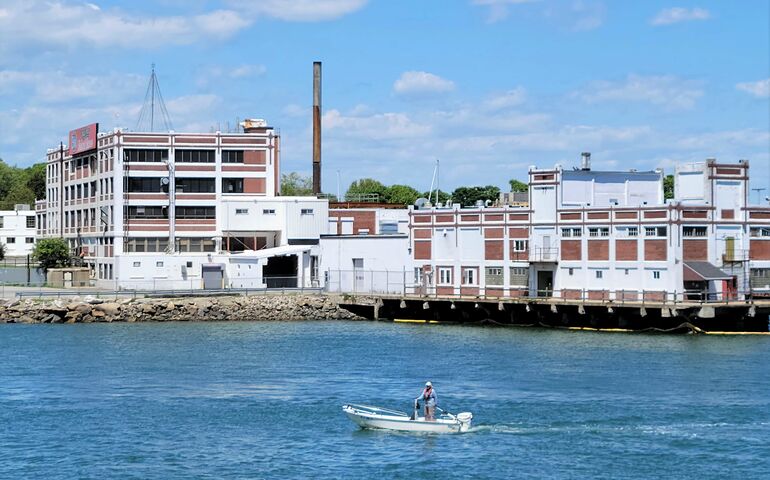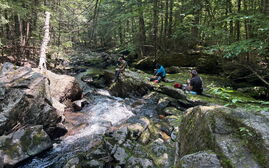14 Maine communities will share $16.2M for brownfields cleanup
 File photo / William Hall
The site of the former B&M baked beans site in Portland is a potential project for new brownfields cleanup and assessment funding.
File photo / William Hall
The site of the former B&M baked beans site in Portland is a potential project for new brownfields cleanup and assessment funding.
Fourteen Maine communities will receive $16.2 million from the U.S. Environmental Protection Agency to expedite the assessment and cleanup of local brownfields sites.
The sum includes 14 grants totaling $10.2 million in the agency’s competitive Multipurpose, Assessment, Revolving Loan Fund, and Cleanup grant programs, called MARC grants for short.
Another $6 million will come in non-competitive supplemental funding.
“We’re working across the country to revitalize what were once dangerous and polluted sites in overburdened communities into more sustainable and environmentally just places that serve as community assets,” EPA Administrator Michael Regan said in the release.
The investment is the EPA’s single largest investment in brownfields ever made, said David Cash, the EPA's New England regional administrator.
“This funding will revitalize communities across New England, and jump start economic redevelopment and job creation in many of New England's hardest hit and underserved communities,” Cash said.
Gov. Janet Mills said the money would allow communities “to properly assess and clean up contaminated sites, paving the way for redevelopment that can create jobs and enhance our communities.”
The investment will help communities identify hazardous substances, clean up dangerous sites, and improve the environment.
Many communities that are under economic stress, particularly those located in areas that have experienced long periods of disinvestment, lack the resources needed to initiate brownfields cleanup and redevelopment projects. The transition of brownfields sites into assets helps communities attract jobs and promote economic revitalization, according to the release.
Maine organizations selected to receive MARC grants are:
- Androscoggin Valley Council of Governments, Auburn, $500,000. Priority sites include vacant and underutilized lots in Lewistown’s downtown and a former automobile repair shop in downtown Auburn.
- City of Augusta, $500,000. Priority sites include a 57,330-square-foot former cotton and textile manufacturing facility, and the former Carey’s Body Shop.
- City of Bangor, $897,850. Priorities include cleaning up Building No. 610 at Bangor International Airport property at 287 Godfrey Boulevard. The site is contaminated with inorganic contaminants, heavy metals, mold, volatile organic compounds, semi-volatile organic compounds, PCBs, and per-and poly-fluoroalkyl substances.
- City of Caribou, $900,000. Priorities include cleaning up the 3.2-acre Caribou diesel electric power plant and outbuildings at 142 Lower Lyndon St.. The site is contaminated with waste oil and hazardous substances, including stored diesel, lube oil, waste oil, waste oil-contaminated water, sludge, antifreeze, degreaser/solvent, and water treatment chemicals.
- Town of East Millinocket, $500,000. Priority sites include a former paper mill and former auto repair station.
- Friends of the Boat School Marine Trades Development Corp., $675,000. Priorities include cleaning up the 8.4-acre Maine Marine Technology Center property at 16 Deep Cove Road in Eastport. Groundwater is contaminated with 1,2-Dichloroethane. PCBs, mercury, solvents, petroleum products, and inorganic materials have been found within buildings on the property.
- Town of Lincoln, $750,000. Priorities include cleaning up a 58-acre parcel at the Lincoln Pulp & Tissue site at 50 Katahdin Ave., adjacent to the Penobscot River. The site is contaminated with heavy metals, per- and polyfluoroalkyl substances, inorganic contaminants, and volatile organic hydrocarbons.
- Town of Millinocket, $500,000. Priority sites include a vacant dry cleaner facility, former high school, and former auto repair facility.
- Our Katahdin, of Millinocket, $1.5 million. Priorities include cleaning up a 15-acre tank farm/railroad corridor at 1 Katahdin Ave., contaminated with inorganic contaminants, petroleum and metals.
- The Passamaquoddy Tribe at Pleasant Point, of Perry, $1.3 million. The target area is 128,411 acres of tribal lands throughout the state including trust land, fee land, the Pleasant Point and Indian Township Reservations, and non-Indian lands in the Washington County communities of Calais and Meddybemps. Priority sites include the Charlotte Smith Property, a vacant warehouse, gas service station and garage known as the Calais Site, the 555-acre Backscatter Radar Site, and the former Beatrice Rafferty School.
- City of Portland, $500,000. Priority sites include a two-block industrial tract being used as an unpaved trailer lot and a scrapyard, and a 7-acre commercial center.
- City of Saco, $500,000. Priority sites include former automotive repair facilities and former gas stations.
- Sunrise County Economic Council, Machias, $500,000. Priority sites include the old Machias town dump, a local airport, a vacant and abandoned pet food plant, an abandoned solvents manufacturing facility, and a waterfront railroad site.
- Town of Wiscasset, $700,000. Priorities include cleaning up the 4.5-acre North Point Fill Area at the northern tip of the Birch Point Peninsula, contaminated with inorganic contaminants and polycyclic aromatic hydrocarbons.
Awarded supplemental funding are the following:
- Maine Department of Economic and Community Development, Augusta, $3 million. The department has received a total of $8.5 million from EPA in prior years and has made loans or subgrants leading to 29 cleanup projects either completed or in progress. Potential projects for the new funding include the Baked Bean Factory in Portland and Caribou Power Plant in Caribou.
- Southern Maine Planning and Development Commission, Saco, $3 million. The commission has received a total of $12.8 million from EPA in prior years and has made loans or subgrants leading to 21 cleanup projects either completed or in progress. Potential projects highlighted for use of the new funding include Prime Tanning in Berwick and International Woolen Mill in Sanford.













0 Comments